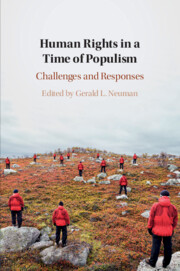Book contents
- Human Rights in a Time of Populism
- Human Rights in a Time of Populism
- Copyright page
- Contents
- Contributors
- Preface
- Acknowledgments
- 1 Populist Threats to the International Human Rights System
- 2 US Human Rights Policy and the Trump Administration
- 3 Rule-of-Law Rights and Populist Impatience
- 4 Populism and Human Rights in Poland
- 5 The Legal Architecture of Populism
- 6 Representation, Paternalism, and Exclusion
- 7 Penal Populism in Emerging Markets
- 8 The Populist Threat to Democracy in Myanmar
- 9 In Defense of Democratic Populism
- 10 Populism and International Human Rights Law Institutions
- 11 Human Rights Responses to the Populist Challenge
- Index
- References
1 - Populist Threats to the International Human Rights System
Published online by Cambridge University Press: 22 April 2020
- Human Rights in a Time of Populism
- Human Rights in a Time of Populism
- Copyright page
- Contents
- Contributors
- Preface
- Acknowledgments
- 1 Populist Threats to the International Human Rights System
- 2 US Human Rights Policy and the Trump Administration
- 3 Rule-of-Law Rights and Populist Impatience
- 4 Populism and Human Rights in Poland
- 5 The Legal Architecture of Populism
- 6 Representation, Paternalism, and Exclusion
- 7 Penal Populism in Emerging Markets
- 8 The Populist Threat to Democracy in Myanmar
- 9 In Defense of Democratic Populism
- 10 Populism and International Human Rights Law Institutions
- 11 Human Rights Responses to the Populist Challenge
- Index
- References
Summary
This chapter frames the discussion that follows by examining the concept of populism, which is debated among political scientists, and the negative effects that populism may produce on internationally recognized human rights. The chapter emphasizes an understanding of populism as a form of politics that employs an exclusionary notion of the people as opposed to disfavored groups that are unworthy and that purports to rule on behalf of the people, whose will should not be constrained. The chapter describes both internal and external effects of populists' rise to power. Domestically, populist governance threatens the human rights of the excluded group, but also poses danger for members of the majority, as leaders seek to entrench themselves in power and undermine checks. Externally, the influence of populism on foreign policy reduces support for the international human rights regime, in a manner that has become increasingly problematic as populists gain power in more countries that previously played key roles in maintaining it.
Keywords
- Type
- Chapter
- Information
- Human Rights in a Time of PopulismChallenges and Responses, pp. 1 - 19Publisher: Cambridge University PressPrint publication year: 2020
References
- 1
- Cited by



